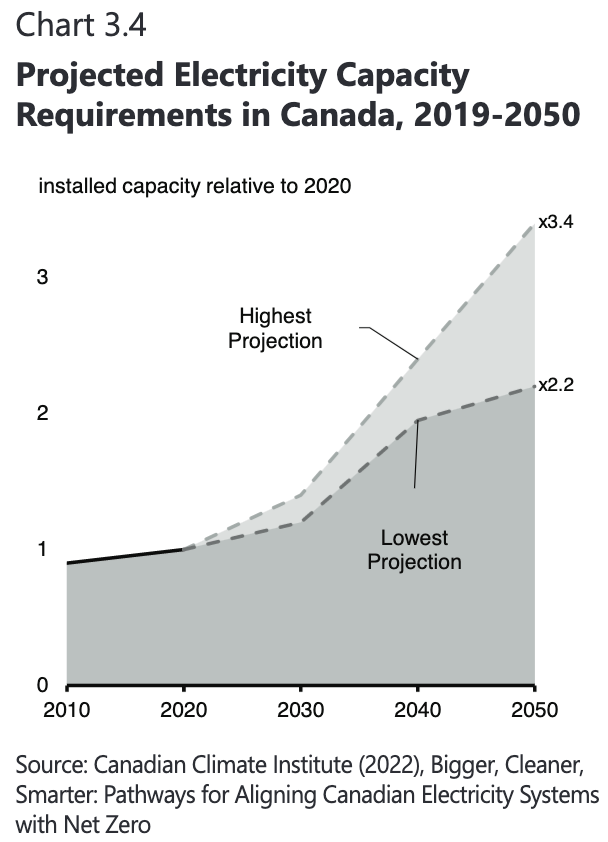Why Canada Needs an Electricity Strategy
Jake Brooks
May 9, 2023
The federal budget released on March 28 confirmed in dramatic fashion that Canada is facing a major construction challenge. Our electric power grids, which provide essential power services across the country, will need huge upgrades over the next 26 years. “Canada’s electricity demand is expected to double by 2050” the budget predicted, saying “our electricity capacity must increase by 2.2 to 3.4 times compared to current levels.” These changes are needed partly to serve rising demand for electricity, and partly to de-carbonize existing power systems by 2050. The scale of the infrastructure development ahead is unprecedented. The implications for the economy and the environment are enormous.
Judging by the $400 billion estimate recently disclosed by Ontario’s grid operator, the cost of power system improvements across Canada could exceed a trillion dollars in this timeframe. What’s more, much of this expenditure will be needed in the early stages, in the next 10 or 11 years. Canadians will surely be asking questions about where this money will come from, and how it will be spent.
These construction expectations did not originate with a national plan or agency. They came from sober analysis conducted by independent grid operators, financial institutions, and other experts. For some time now, analysts unaffiliated with the energy industry have been tallying up the implications of population growth, current construction costs, policy announcements, corporate ESG plans, and the trends showing Canadians’ growing desire to electrify many aspects of our daily lives. Other countries are seeing similar trends.
For Canadians, it has become timely to consider how decision-makers and regulators will oversee such a massive investment in the energy system. Without early attention, the work could be improperly focused, and money could be wasted on insufficiently considered choices.
It’s no surprise that Electricity Canada, the organization representing electricity generation and transmission companies across the country, is calling for a Canadian Electricity Strategy. They can see more clearly than most the dangers of entering this phase of major development without co-ordination between the many regions, governments, and business entities in the sector.
In a similar vein, government and industry recently announced the launch of a Canadian Critical Minerals Strategy. Recognizing that focused multi-party efforts were necessary to develop certain capabilities, they defined broad objectives and specific targets, earmarked funds, identified roadblocks and set up cross-sector expert groups to tackle them. Canada also has a Health Data Strategy, a Geoscience Strategy, an Artificial Intelligence Strategy and more.
A Canadian electricity strategy will probably need to wrestle with significant public policy questions such as:
- How far should government go to encourage major new transmission lines between provinces and regions?
- What kind of community input and Indigenous engagement will be necessary for each type of development?
- Do we have the right skills and training programs?
- How to co-ordinate the timing of major investments with the natural schedule for replacement of existing capital assets?
Francis Bradley, the CEO of Electricity Canada, recently said, “Canada needs a cross-government strategy to co-ordinate these efforts, pool resources, coordinate funding and work with the electricity sector to implement the planning and building process.”
The primary reasons that Canadians will benefit from having an electricity strategy are:
- To keep infrastructure costs down, mainly by minimizing duplication and improving co-ordination
- To stay on track with emission reduction goals
- To better prepare Canadian companies to compete effectively with international suppliers
- To ensure appropriate forms of public engagement and regional differences are reflected in infrastructure development.
In the near term, a well-designed electricity strategy can be expected to open up a host of welcome new career opportunities while stimulating economic activity in many regions of the country. Longer term it would support sustainable development across the economy, and a continuing positive role for Canada on the world stage.
In the words of the RBC’s David Dal Bello, “A thoughtfully laid out blueprint crafted in partnership with all stakeholders is a much more prudent approach to a successful energy transition than unilateral, short-term decisions … Without an appropriate strategy, we will collectively fail to reach our climate goals or risk making an essential service unaffordable for many consumers.”
Jake Brooks is an energy consultant who served as Executive Director of the Association of Power Producers of Ontario for many years.

